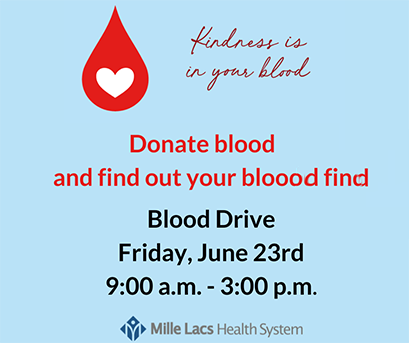Knowing your blood type
June 13, 2023
Blood type is inherited, just like eye color, height, and other genetic traits. Whether your blood group is type A, B, AB, or O is based on the blood types of your mother and father.
The particular blood types are determined by the presence or absence of certain antigens – substances that can trigger an immune response if they are foreign to the body. There are four major blood groups determined by the presence or absence of two antigens, A and B, on the surface of red blood cells. In addition to the A and B antigens, there is a protein called the Rh factor, which can be either present (+) or absent (–), creating the 8 most common blood types (A+, A-, B+, B-, O+, O-, AB+, AB-).
Studies show that less than 50 percent of Americans know their blood type. One easy way to find out your blood type is to donate blood. Donating blood is easy. The actual procedure to donate blood takes under ten minutes, and the whole process of registering, screening, donating, and a few minutes of rest afterward usually takes just over one hour. One single blood donation may help to save up to three lives. After the donation is complete, donors receive a blood donor card or can create an online donor profile, that will list their blood type.
One of the benefits of knowing your blood type besides being prepared for emergency type needs, is understanding some of the other health factors associated with different blood types. There are studies showing correlations between certain blood types and increased risk factors for conditions such as: heart disease, memory issues, certain types of cancers, etc.
The American Red Cross collected over 26,000 fewer blood donations than needed in May to meet the needs of patients. Every two seconds, someone in the U.S. needs blood. Although an estimated 38% of the U.S. population is eligible to donate blood at any given time, less than 10% of those eligible actually donate.
Donating blood helps patients of all ages: accident and burn victims, heart surgery and organ transplant patients, those battling cancer, chronic diseases, or those that have suffered from traumatic injuries, and many more.
Type O negative blood is the most sought-after as it is the universal blood type, meaning it can be used in transfusions for any blood type. Although type O blood is the most common type, only 7 percent of the U.S. population has type O negative blood.
According to the American Red Cross, approximately 45 percent of Caucasians are type O (positive or negative), but 51 percent of African-Americans and 57 percent of Hispanics are type O. Minority and diverse populations, therefore, play a critical role in meeting the constant need for blood.
If you have an interest in donating blood to help save lives, and at the same time figure out your blood type if you don’t already know it, schedule your blood donation at the upcoming blood drive sponsored by Mille Lacs Health System. The event will be held on Friday, June 23rd, 9:00 a.m. – 3:00 p.m. at the Holy Cross Center on the Mille Lacs Health System Onamia campus. Visit www.redcross.org/give-blood and use Onamia’s zipcode (56359) in the search for a location, or call 1-800-RED-CROSS (1-800-733-2767) to schedule your donation.
